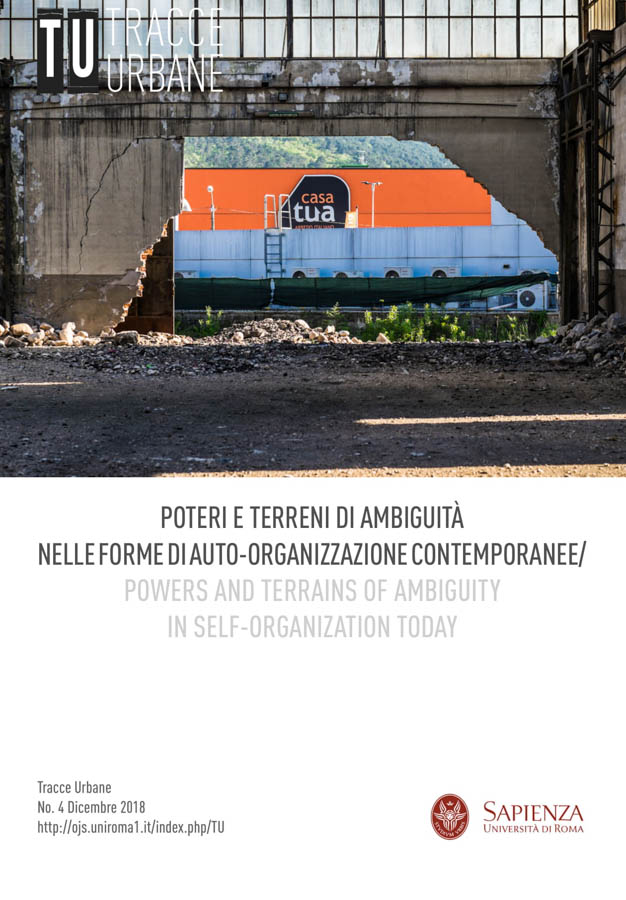New dynamics in citizen re-appropriation strategies of collective urban spaces. Case of Madrid.
DOI:
https://doi.org/10.13133/2532-6562_2.4.14365Parole chiave:
reappropriation, collective space, urban activismAbstract
Citizen engagement in re-appropriation of collective spaces has long meant utopian spaces of resistance, a refuge, an autonomous community working aside of the system. This vision is being revised. The aim of this study is to examine the effects on the urban space of the changes in the way stakeholders’ relations are stablished in these initiatives.
We examine two very different recent projects in the periphery of the city of Madrid belonging to a new generation of co-produced spaces. There is a vertical dimension of relationships between administration, citizens and experts and there is the question of what effects these initiatives have on the neighbourhood. The study goes through the background social movements and the administration programs that compose the puzzle of today´s activism. We find a dense heterogeneous spatial network working together and producing collective space. Notwithstanding the contradictions that emerge during the process, the moment is one of transition with both hope and uncertainties
Riferimenti bibliografici
Alguacil, J. (2000). Calidad de vida y praxis urbana: Nuevas iniciativas de gestión ciudadana en la periferia social de Madrid. Centro de Investigaciones Sociológicas. Colección “Monografías” (Vol. n. 179). http://habitat.aq.upm.es/cvpu/acvpu.pdf (07.07.2017)
Andreeva Eneva, S., & Abellán, J. (2017). El Madrid previo al Ayuntamiento del Cambio: Políticas y Governanza urbana durante el Periodo 1995-2015. Retrieved from http://www.academia.edu/35785744/EL_MADRID_PREVIO_AL_AYUNTAMIENTO_DEL_CAMBIO._Políticas_públicas_y_modelo_de_gobernanza_urbana_durante_el_período_1995-2015 (10.07.2018)
Arana, J. (2014). "Wastelands". In: T. Franchini & J. Arana (Eds.), Strategies for the post-speculative city (pp. 61–67). Wroclaw (Poland): Association of European Schools of Planning.
Bey, H. (1991). The temporary autonomous zone. New York: Autonomedia. https://doi.org/10.1353/jsr.2010.0007
Carmona, P. (2007). "Apuntes del subsuelo: contracultura, punk y hip hop en la construcción del Madrid contemporáneo". In: Observatorio Metropolitano (Ed.), Madrid: ¿La Suma de Todos? Globalización, Territorio, Desigualdad (p. 477). Madrid: Traficantes de Sueños. https://doi.org/10.1017/CBO9781107415324.004
Chan, J., To, H. P., & Chan, E. (2006). Reconsidering social cohesion: Developing a definition and analytical framework for empirical research. Social Indicators Research. https://doi.org/10.1007/s11205-005-2118-1 (07.07.2017)
De Solà-Morales, I. (2013). "Terrain vague". In Terrain Vague: Interstices at the Edge of the Pale. https://doi.org/10.4324/9780203522172
Delgado, M. (2011). El espacio público como ideología. Madrid: Los Libros de la Catarata.
Diaz Orueta, F., & Lourés Seoane, M. L. (2018). "Madrid: La Ruptura de un Modelo institucional Local Refractario a las Nuevas Iniciativas Sociales contra la Igualdad". In: M. Pradel & M. García Cabeza (Eds.), El momento de la ciudadanía: innovación social y gobernanza urbana (pp. 144–168). Madrid: Los Libros de la Catarata.
Foucault, M., & Miskowiec, J. (1986). Of Other Spaces. Diacritics. https://doi.org/10.2307/464648
Fraisse, L. (2018). Potential and ambivalent effects of grassroots initiatives on neighbourhood development. Retrieved from http://www.socialpolis.eu/uploads/tx_sp/EF11_Paper.pdf (07.07.2017)
García, M. (2006). Citizenship practices and urban governance in European cities. Urban Studies, 43(4), 745–765. https://doi.org/10.1080/00420980600597491
Gomez Nieto, A. (2015). Urban complex regeneration of empty spaces through informal processes. TRIA-TERRITORIO DELLA RICERCA SU INSEDIAMENTI E AMBIENTE. https://doi.org/10.6092/2281-4574/3019
Hernández Aja, A. (2003). Ciudadanos fecundos: Participación y calidad de vida. Ecología y Ciudad: Raíces de Nuestros Males y Modos de Tratarlos, 247–266.
Janoschka, M., & Mateos, E. (2015). Agrietar el capitalismo mediante actos de ciudadanía y el recurso a políticas de lugar: Geografías de la #spanishrevolution. ACME.
Mitchell, D. (1995). The End of Public Space? People’s Park, Definitions of the Public , and Democracy. Annals of the Association of American Geographers, 85(1), 108–133.
Stavrides, S. (2015). Common space as threshold space: urban commoning in struggles to re-appropriate public space. Footprint, (16), 9–20. https://doi.org/10.7480/footprint.9.1.896
Stigendal, M. (2010). Cities and Social Cohesion: Popularizing the results of Social Polis. Malmö University. Department of Urban Studies. Retrieved from http://hdl.handle.net/2043/10976
Taylor, M. (2007). Community participation in the real world: Opportunities and pitfalls in new governance spaces. Urban Studies. https://doi.org/10.1080/00420980601074987
Walliser, A. (2013). New urban activisms in spain: Reclaiming public space in the face of crises. Policy and Politics, 42(3), 329–350. https://doi.org/10.1332/030557313X670109
##submission.downloads##
Pubblicato
Come citare
Fascicolo
Sezione
Licenza
NOTA DI COPYRIGHT
Proposta di licenza Creative Commons
1. Proposta per riviste Open Access
Gli autori che pubblicano su questa rivista accettano le seguenti condizioni:
Gli autori mantengono i diritti sulla loro opera e cedono alla rivista il diritto di prima pubblicazione dell'opera, contemporaneamente licenziata sotto una Licenza Creative Commons - Attribuzione che permette ad altri di condividere l'opera indicando la paternità intellettuale e la prima pubblicazione su questa rivista.
Gli autori possono aderire ad altri accordi di licenza non esclusiva per la distribuzione della versione dell'opera pubblicata (es. depositarla in un archivio istituzionale o pubblicarla in una monografia), a patto di indicare che la prima pubblicazione è avvenuta su questa rivista.
Gli autori possono diffondere la loro opera online (es. in repository istituzionali o nel loro sito web) prima e durante il processo di submission, poiché può portare a scambi produttivi e aumentare le citazioni dell'opera pubblicata (Vedi The Effect of Open Access).


